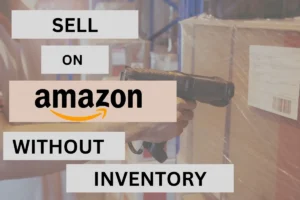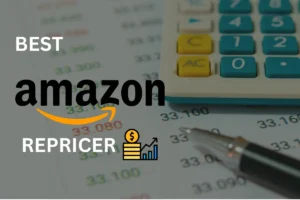Are you an aspiring eCommerce seller looking to get into the profitable world of online arbitrage?
Have you heard some of the hype but can’t find any solid details to get you started?
If so, look no further! This complete guide will equip you with everything you need to know about online arbitrage, including how to find profitable online arbitrage leads lists and how online arbitrage for beginners can be a great way to enter eCommerce.
From beginner topics, like finding online arbitrage leads at a discount, to advanced topics, like utilizing third-party tools, everyone can benefit from this comprehensive guide. As a result, you’ll be able to confidently explore every aspect of the online arbitrage industry, especially if you’re looking for online arbitrage for beginners.
So grab your cup of coffee, buckle up, and get ready. Because this guide to online arbitrage could ultimately lead to your financial freedom.
What is Online Arbitrage?
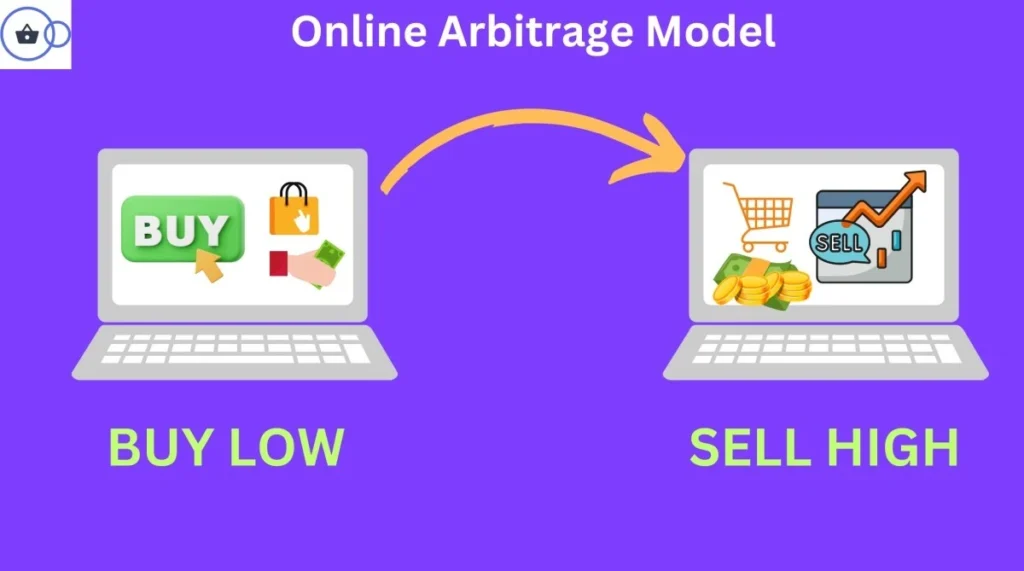
Online arbitrage is a business model where a seller purchases products from one online retailer at a lower price and resells them at a higher price on another online marketplace.
It involves finding products with a significant price difference between the purchase and selling price, then purchasing them in bulk or individually to resell at a higher price.
Online arbitrage has become a popular way for individuals to start an e-commerce business due to its low start-up costs and flexibility. It is especially ideal for online arbitrage for beginners.
It is also a profitable business model. Online arbitrage sellers can make anywhere between $2,000 to $4,000 selling just one product on Amazon. The key to success is finding the right arbitrage leads at the right price.
It is important to keep in mind that online arbitrage can be a time-consuming process. It involves researching and analyzing potential products, finding reputable suppliers, and managing inventory and shipping. However, with the right tools and strategies, it can be a profitable venture for those willing to put in the work.
Pros and Cons of Online Arbitrage
Arbitrage leads are a great way to supplement income or generate startup capital. However, knowing all the advantages and disadvantages of engaging in this type of business is important. From here, you can decide if it’s right for you!
Here are some pros and cons associated with arbitrage:
Pros of Online Arbitrage
Low Overhead Costs
One of the most significant advantages of online arbitrage is that it can cost as little as $100 to get started. In other words, you don’t need an expensive office space or other physical assets. All you need is a computer and internet connection to get going with your online arbitrage leads list.
If you have a talent for finding deals or bargain-hunting software, throwing together a solid inventory should be no problem!
Learning Opportunity
Take this as an invaluable opportunity! You learn the ins and outs of navigating Amazon and the online marketplace, crucial for online arbitrage for beginners.
Flexibility
You have the freedom to work from anywhere at any time. This makes it easy to manage your own schedule and work around your lifestyle.
You’re able to source inventory and work from home. This has an untold number of benefits, so kindly pointed out by the quarantine. If you have children or other responsibilities at home, working from home is a great idea. And there’s plenty of storage space.
As a global culture, we’ve learned to balance and delegate space for living and work.
Potential for High Profits
With the right strategies, you can stand to make a significant amount of money with online arbitrage.
To make sure that your online arbitrage efforts are profitable, there are some strategies you can use to maximize returns:
- Buy in bulk – Buying items in bulk can help you take advantage of discounts and increase margins on each sale.
- Diversify sources – Find suppliers from different websites, so your inventory is always full of new items.
- Track shipping costs – Consider shipping costs when determining product markups so you remain profitable after all expenses are taken into account.
With the right resources and monitoring of assets, you can optimize your arbitrage for accumulating high profits over short periods.
Cons of Online Arbitrage
High Risk
There’s always a risk when it comes to investment and trading; the same goes for online arbitrage. It can be challenging to predict the market, and your profits could suffer if you don’t do it correctly.
What’s more, you’ll be dealing with a lot of cutthroat competition. Bargain hunters from every walk of life are a dime-a-dozen in these corners of the internet.
You’re far from the only one to have the idea; just the only one going into it with a pro guide! As such, you’ll have to stay on your game and ahead of the competition to make a profit!
And more importantly, don’t let the competition drive you to panic purchase goods you can’t liquidate! Finding the right arbitrage leads is key to minimizing this risk.
Loss of Capital and Time
Although profits can be made, there is also the possibility of loss. Prices can quickly change, and you could end up with less money than you started with if you aren’t cautious.
On the other hand, online arbitrage requires research, analysis, and constant monitoring. You may not have enough hours to dedicate to this type of business, but a good online arbitrage leads list can help cut down research time.
Make sure you’re scoping for deals regularly at prime hours. Don’t be afraid to let a deal go if it means spending money you don’t have. Part of the advantage of online arbitrage is that it requires minimal reinvestment, meaning it’s all about optimizing savings.
Regulatory Issues & Risk of Fraud
As online arbitrage involves trading across borders, it is important to understand the regulations in different countries. Ensure that you are compliant to avoid any legal implications.
As online arbitrage involves trading with people you don’t know, there is always a risk of fraud or other malicious activities. This could result in financial losses or banishment if you aren’t careful.
Difficulty Understanding Markets & Scaling
To successfully carry out online arbitrage, you need a thorough understanding of the marketplace and how different economies interact. This can take time and practice to gain an understanding.
Moreover, online arbitrage is a manual process requiring constant monitoring. As such, it can be challenging to scale, as the trader must dedicate more time and energy.
When your online arbitrage operation is well-informed and executed, however, these disadvantages can be easily avoided. Continue reading to learn how to do so.
Is Online Arbitrage Completely Legal?
Buying at a discount and reselling closer to market price? Sounds like a scam or a pawn, at the very least. As long as everything is legally acquired, online arbitrage is an entirely legal way to generate profit!
Online arbitrage for beginners is a fantastic entry point for learning how to profit within the rules.
That said, the specifics of that legality are more complicated than you might think. In general, it is legal to take advantage of price discrepancies between different websites and stores. As long as the items are purchased for personal use.
However, there may be other legal considerations depending on your country or state’s laws. For example, some countries have restrictions on how much you can purchase from overseas retailers.
With these considerations in mind, you can easily reap the rewards of this business model with minimal risk.
Is Online Arbitrage Allowed On Amazon?
Believe it or not: yes! Amazon does allow the online arbitrage business model as long as you follow their terms of service. Additionally, Amazon has policies and restrictions for resellers, so read over their terms carefully before conducting any transactions.
Also, remember to pay taxes on any profits and to keep accurate records of your sales and losses.
Failure to comply with Amazon’s terms of service can lead to account suspension or even closure. Additionally, it is important to know that the prices you buy may not always match the prices listed on Amazon.
This is because different sellers have different policies for setting their own prices. This may result in discrepancies between them and Amazon’s official price.
How to Get Started with Online Arbitrage
Getting started with online arbitrage can seem daunting, but it can be a profitable venture with the right approach. Here are some steps to consider when starting with online arbitrage:
1. Choose a profitable niche
The first step is to choose a niche that is profitable and has a high demand for products. Research niches that are currently trending and have high demand, perfect for online arbitrage for beginners. You can use market research tools to identify high-demand products.
2. Identify profitable marketplaces
Once you have identified a niche, the next step is to find marketplaces that sell those products. Use an online arbitrage leads list to find the best options. Amazon, Walmart, and eBay are some of the popular marketplaces for online arbitrage due to their large customer base.
3. Set up a seller account
To start selling on any of the marketplaces, you will need to set up a seller account. Each marketplace has its own requirements for setting up a seller account, so be sure to follow the instructions carefully.
4. Start sourcing products
To find profitable products, you will need to source products from online stores. Use price tracking tools like Keepa, Honey, and CamelCamelCamel to find the best deals.
5. Analyze product data
Analyze product data to determine whether a product is profitable or not. Look at the product’s sales rank, pricing, reviews, and the seller’s reputation to determine whether it’s worth investing in. A tool like Ecom Circles Extension can help you analyze product data to give you all the information you need to make a decision.
6. Purchase and list the products
Once you’ve identified profitable products, purchase them and list them on your chosen marketplace. Make sure to list the products with accurate descriptions and images.
7. Monitor and adjust prices
Monitor your prices regularly and adjust them to remain competitive and win buy boxes. You can use repricing tools like RepricerExpress, Ecom Circles Repricer, or Sellery to automatically adjust prices based on market conditions.
By doing this, you will be forcing the hand of marketplace algorithms to favor your listings in the buy box over your competitors.
8. Manage inventory and order fulfillment
Keep track of your inventory levels and fulfill orders promptly. Most online arbitrage marketplaces prioritize customer experience and one way to improve customer experience is to fulfill orders promptly.
You can use inventory management software like Sellbrite, Skubana, and Ecom Circles Automated Dropshipping Software to manage your inventory.
9. Optimize listings
Optimize your listings by using the right keywords, including high-quality images, and providing accurate product descriptions. This will help your listings rank higher in search results and attract more customers.
10. Monitor and analyze performance
Monitor your performance metrics, including sales, profits, and customer feedback. Use this information to identify areas for improvement and make changes to your strategy as needed.
Essential Online Arbitrage Tools that Save you Time and Money
To get the most out of online arbitrage, it is important to have access to the right tools. Here are some FREE essential online seller tools that will save you time and money when engaging in online arbitrage:
Amazon FBA Revenue Calculator
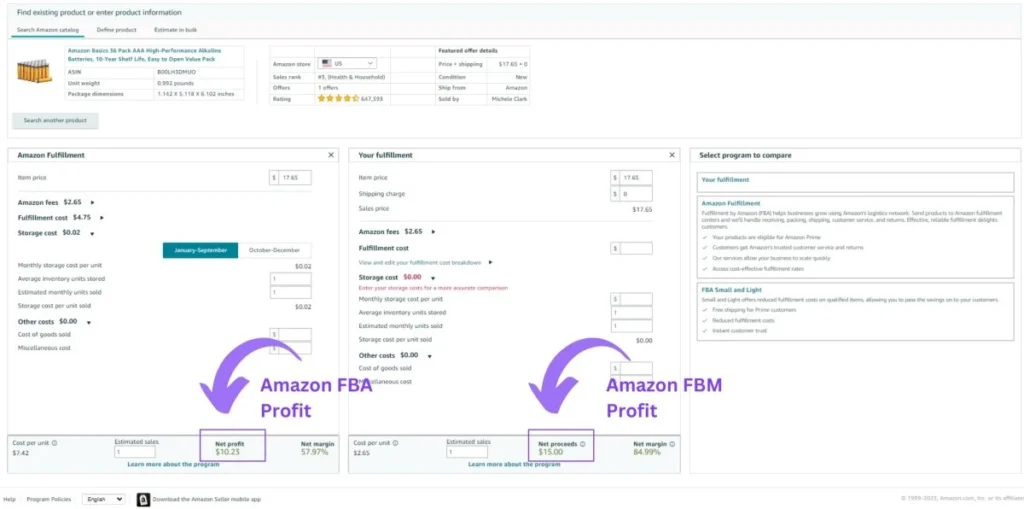
The Amazon FBA Revenue Calculator is a handy tool that allows online sellers to calculate their profit margins. It takes into account all fees associated with selling on Amazon’s Fulfillment By Amazon (FBA) program and calculates your net profit.
The tool also provides FBM calculations that shows your net profit and profit margins should you decide to go that route.
Knowing your exact margins before making a purchase is vital. It will help prevent unprofitable orders from being placed and ensure maximum success with online arbitrage.
WFS Calculator
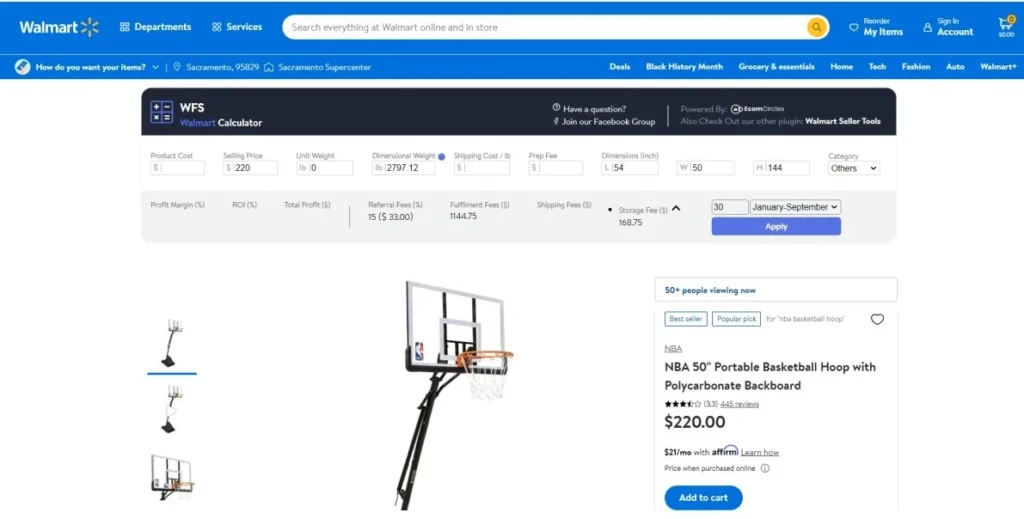
The WFS Calculator by Ecom Circles is an online calculator that assists sellers by computing their fixed costs when purchasing items for resale with Worldwide Fulfillment Services (WFS). It is basically the Walmart version of the Amazon FBA Revenue Calculator mentioned above.
The tool takes into account all associated fees, such as shipping costs, tariffs, and customs duties. This way, you’re always aware of your bottom line before making a purchase.
Wholesale Catalog Scanner

The Wholesale Catalog Scanner is an online tool that can be used to identify potential arbitrage opportunities in online wholesale catalogs quickly.
With the help of this online scanner, online sellers are able to compare costs between wholesale vendors. Suddenly, online marketplaces like Amazon or eBay go from unnavigable to your best friend with just a few clicks.
Ecom Circles Extension
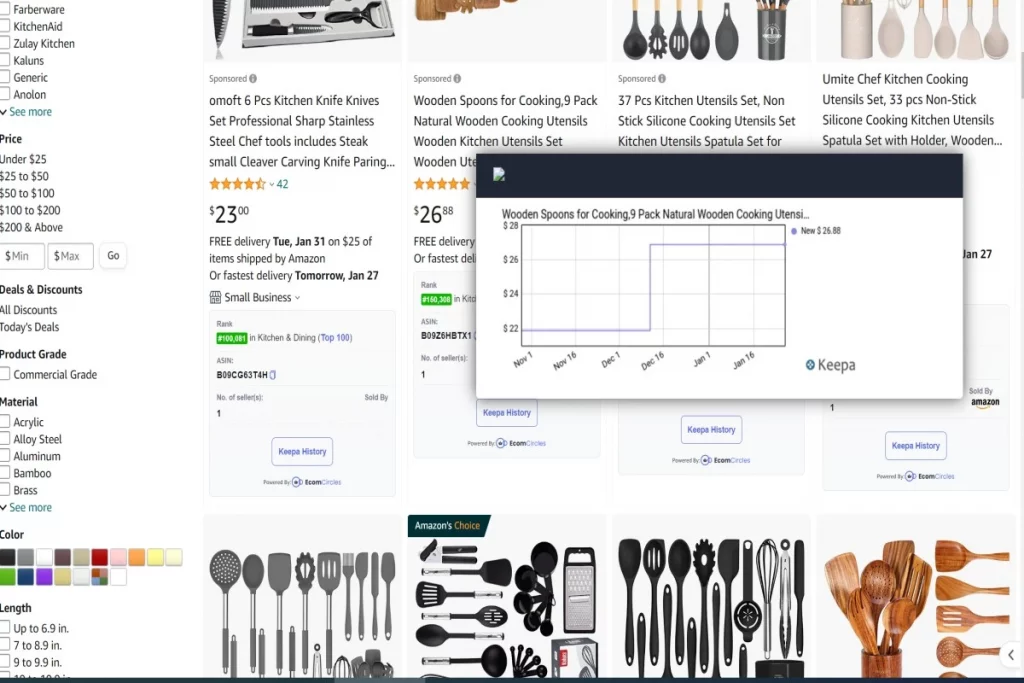
The Ecom Circles Extension is a tool that helps with your product research. One of the key features of this tool is that it is compatible with both Amazon and Walmart, making it easier for sellers to find profitable products to sell.
The chrome extension displays Keepa graphs, price history charts, and stock data for every product on Walmart and Amazon. Additionally, the tool displays information such as number of FBA or FBM sellers (for Amazon) as well as number of WFS sellers (for Walmart).
Finally, the item restriction checker ensures that sellers do not run into issues with restricted products, which can save time and prevent potential headaches.
How to Find and Select Products to Sell online?
Finding and selecting products to sell online can be a daunting task. But with the right tools, it doesn’t have to be. Online arbitrage is an incredibly effective method for finding profitable items to resell online. However, it takes time and practice to master the art of online arbitrage.
Analyze Product Demand
As an online arbitrage seller, analyzing product demand is a crucial step in identifying the best products to sell. The best products are products with a high search volume and low competition.
Use product research tools like Google Trends, Ecom Circles Extension, or Keepa to analyze the demand for the products you have identified. These tools will help you understand the sales volume, competition, and profit margins for each product.
Research the competition
Conduct a competitive analysis to understand the strategies your competitors are using to sell similar products. Look at factors like pricing, product descriptions, images, and customer reviews. You also want to check who your competitors are.
For example, on Amazon, you can either compete against FBA sellers, FBM sellers, or Amazon themselves. If you have a product that Amazon sells, you might not want to list that item because you will be directly competing against Amazon and usually, Amazon comes up on top.
These are some of the things you should consider in your competitor research. The Ecom Circles Extension provides competitor information and other info to help in your competitor research.
Evaluate profitability
Determine the profitability of each product by looking at the cost of acquiring the product, shipping fees, and the price you can sell the product for. There are tools that can help you calculate your profitability.
If you sell on Amazon, the Amazon FBA Revenue calculator can help you deduce your profit margins. If you sell on Walmart, the Ecom Circles WFS Calculator can help in that regard.
Best Online Arbitrage Leads Lists
If you do not want to go through the process of doing your own product research, you can use an online arbitrage leads list.
An online arbitrage leads list is a list of potentially profitable products compiled by a third-party service provider that can be used by online arbitrage sellers to find new products to sell. The list typically includes information such as product name, ASIN, category, price, and potential profit margins. Online arbitrage leads lists help sellers to find new products to add to their inventory and increase their sales and profits.
At Ecom Circles, we are always hard at work to make selling on Amazon and Walmart easier for our users. We are now offering online arbitrage sourcing leads list of various types.
Our dropshipping, 2-step, FBA, wholesale and Walmart lead lists offer online arbitrage opportunities that are sure to meet your needs. With so many options, you’re sure to find a list that fits your specific needs and budget.
Dropshipping / 2-step Lists
Dropshipping is a business model that allows entrepreneurs to run an online store without having to manage inventory. It should be known that platforms such as Amazon generally frown upon this unless you’re using 2-step dropshipping.
Dropshipping lead lists are lists of products available for dropshipping. This can be done directly or via 2-step dropshipping.
Ecom Circles is still the only company to provide these lists, which speaks volumes about our dedication to our customers.
FBA Lead Lists
Lead lists from fulfillment by Amazon (FBA).
Our products range across mostly ungated categories. Though, if you’re interested in deal lists for gated items, we can accommodate those as well. Our items are in the top 1% BSR per category and range from $3-$30 profit. We limit the number of subscribers per list so that there isn’t too much competition among our subscribers
Wholesale Lead Lists
If you want the best of the best, check out our wholesale lead lists! We’ve been working with some of the biggest distributors in the game lately. And all to deliver the highest quality of stock to our customers!
Walmart Lead Lists
Yes, you heard correctly. Among the aforementioned major distributors is Walmart. As such, we have produced Walmart product lists that can be used for FMB or WFS (Walmart fulfillment services)!
Best Online Arbitrage Websites to Source Products
Websites that are a great source of online arbitrage products are everywhere! In fact, you can get them at pretty much any corporate website where you can make purchases. Such companies include but are not limited to:
- Walmart
- Target
- Rite Aid
- Best Buy
- Big Lots
- Dick’s Sporting Goods
- Vitacost
- Disney Store
- Sierra
- Christmas Tree Shops
- Ulta
- DSW
- Academy Sports/Outdoors
- Home Depot
- Lowe’s
- 6PM.com
- CVS
- Walgreens
- Drugstore.com
- Vitacost
Online stores allow companies to liquidate their access to season and discounted items. They’re great for you as an arbitrageur to find sellable inventory!
Luckily, this is a service that Ecom Circles specializes in providing! Our software’s the one-stop-shop for Amazon sellers to find the best tools and deals to optimize their eCommerce store’s metrics! To learn more about how you can cultivate eCommerce success from home, book a call with us today!
Frequently Asked Questions
1. What is online arbitrage, and how does it work?
Online arbitrage is a business model where sellers purchase discounted products from one online retailer and resell them at a higher price on another platform, such as Amazon. Many sellers use online arbitrage leads lists to find profitable products to sell.
2. How can beginners get started with online arbitrage?
Online arbitrage for beginners involves learning how to identify profitable products, use online arbitrage tools, and analyze pricing trends. Using an arbitrage leads list can simplify the product-sourcing process for newcomers.
3. What is the benefit of using an online arbitrage leads list?
An online arbitrage leads list provides sellers with a curated list of profitable products, including essential data like ASINs and profit margins. This saves time and helps sellers quickly identify opportunities for successful selling.
4. Can I make money with arbitrage leads?
Yes! Many sellers make substantial profits using the online arbitrage model on Amazon. By leveraging online arbitrage leads and tracking product trends, you can optimize your sales on Amazon FBA.
5. What tools can help with online arbitrage for beginners?
Using arbitrage tools such as price trackers, product research extensions, and inventory management software can help you manage your online arbitrage business more efficiently. These tools provide real-time data to help with decision-making.




